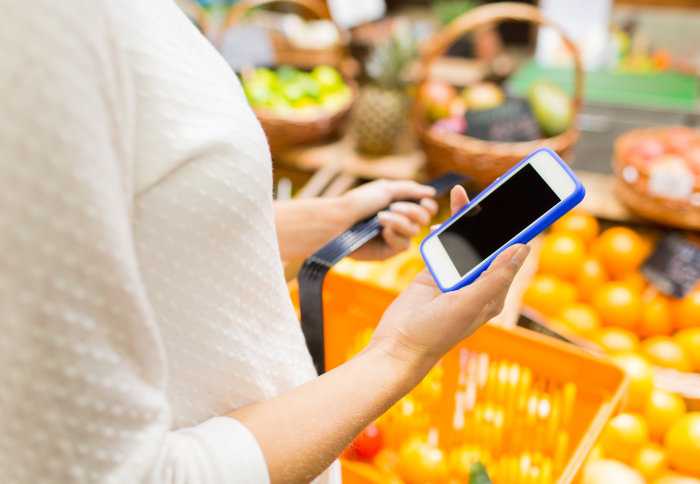DNA test and phone app to ‘nudge’ Waitrose shoppers towards healthier food

A new app, developed by Imperial start-up DnaNudge, will use shoppers’ DNA to help them make healthier choices while food shopping.
In the first study of its kind, researchers at Imperial College London will study the effects of DNA-personalised food choices on health outcomes for people with pre-diabetes.
One in ten people with pre-diabetes, a relatively reversible condition, will go on to develop type 2 diabetes. Type 2 diabetes affects three million people

in UK and costs the NHS £11 billion a year. It can cause heart disease, stroke, and limb amputation – but can be prevented with a healthy diet, exercise, and weight loss.
A major problem in diabetes prevention is that people are generally unaware they are at risk of developing the condition, or of the need for to improve their nutritional choices.
Now, DnaNudge, Imperial, and Waitrose & Partners are launching a clinical trial based on a smartphone app that tells you whether any given food item is compatible with a shopper’s DNA and metabolism.
They will use the information gathered from a smartphone app to intervene in people with pre-diabetes by encouraging healthier eating and suggesting alternative options in the same food category. For example, a person with high blood pressure who scans a bag of crisps might be offered a lower salt option.is compatible with a shopper’s DNA and metabolism.
Principal Investigator of the trial Professor Nick Oliver, from Imperial’s Department of Medicine, said: “This trial allows us, for the very first time, to study how DNA-personalised choices for pre-diabetic people can help prevent high risk people develop type 2 diabetes.”
Scanning the shopper
First, the shopper takes a saliva swab from inside their cheek and puts it into a cartridge which plugs into the DNA analyser, or ‘nudge box’. The analyser then scans the DNA to look for markers of being genetically prone
The potential for improving public health is very exciting, and we’re looking forward to examining the results from this world-first study. Professor Nick Oliver Department of Medicine
to obesity, high blood pressure, or even that they are slow to metabolise caffeine.
The information is shared with the smartphone app or wearable wristwear. When the shopper uses them to scan a potential food item’s bar code, the app will respond with a ‘thumbs up’ if the food is a good match for their genetics or a ‘thumbs down’ before suggesting alternatives within the same food category. The wrist band will show either a green or red light, indicating a healthy or unhealthy choice.
All genetic information will be owned by the user and securely protected on their mobile DnaNudge App.
Next steps for DnaNudge
Later on, the researchers will follow up with study participants to see whether their pre-diabetes has gotten worse, stayed the same, or retreated – and will also look at the app’s role in the outcomes.
Co-investigator of the study Professor Chris Toumazou from Imperial’s Department of Electrical and Electronic Engineering, and CEO of DnaNudge, said: “We are excited to build upon the evidence base for DnaNudge.”
Professor Oliver added: “The potential for improving public health is very exciting, and we look forward to examining the results from this world-first study.”

Waitrose & Partners is supporting the trial by recruiting up to 200 customers in the North London area. Professor Toumazou added: “We are very pleased to be supported by Waitrose & Partners as a key partner in this research, which we hope will represent a landmark in harnessing DNA-based food choices for transforming global health.”
Moira Howie, Partner and Nutrition Manager at Waitrose & Partners, said: “This is a supermarket first - working with cutting-edge research technology that may prevent type 2 diabetes developing in those who are prone to it."
Main image: Shutterstock/Syda Productions
Article text (excluding photos or graphics) © Imperial College London.
Photos and graphics subject to third party copyright used with permission or © Imperial College London.
Reporter
Caroline Brogan
Communications Division
